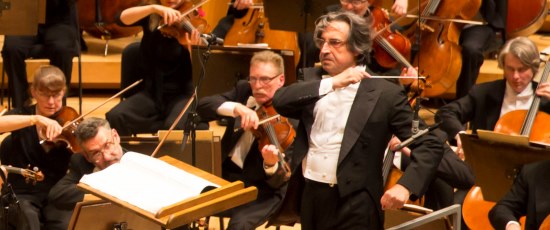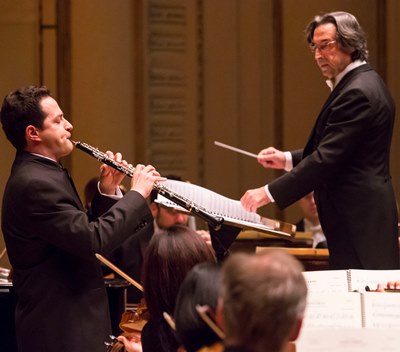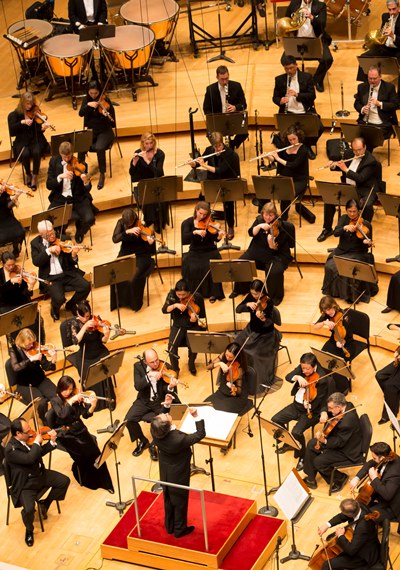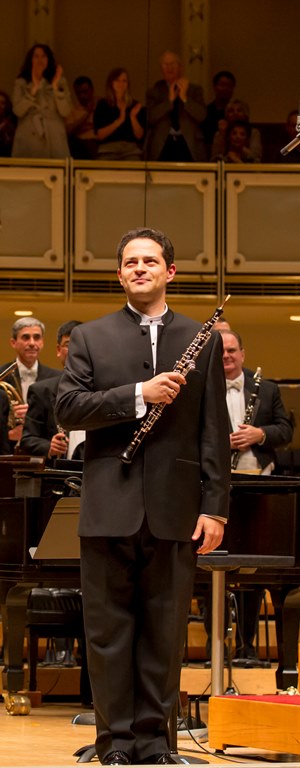Muti and Chicago Symphony embrace spirit, time-stretching cosmos of ‘Divine’ Scriabin
 Review: Chicago Symphony Orchestra, Riccardo Muti conducting; Eugene Izotov, oboe. At Orchestra Hall through June 11. ★★★★
Review: Chicago Symphony Orchestra, Riccardo Muti conducting; Eugene Izotov, oboe. At Orchestra Hall through June 11. ★★★★
By Lawrence B. Johnson
Photos by Todd Rosenberg
There’s a hypnotic enchantment about Alexander Scriabin’s sprawling, sensual “Divine Poem,” and its magic worked at full pitch in the Chicago Symphony Orchestra’s luxurious performance with music director Riccardo Muti Friday afternoon at Orchestra Hall.
 Written just as the 20th century was aborning, when the Russian composer was in his early thirties, “The Divine Poem” is, in effect, a 50-minute symphony in one movement for an orchestra of prodigious means – among other resources nine French horns, a battery of additional brasses, extensive woodwinds and two harps. Scriabin, enamored of Wagner and like Mahler, Schoenberg and Debussy seeking to stretch the boundaries of tonality, viewed “The Divine Poem” as an evocation of man’s progressive spiritual ascendancy, starting with his liberation from God to become God-in-himself to his union with nature to his translation into the universe.
Written just as the 20th century was aborning, when the Russian composer was in his early thirties, “The Divine Poem” is, in effect, a 50-minute symphony in one movement for an orchestra of prodigious means – among other resources nine French horns, a battery of additional brasses, extensive woodwinds and two harps. Scriabin, enamored of Wagner and like Mahler, Schoenberg and Debussy seeking to stretch the boundaries of tonality, viewed “The Divine Poem” as an evocation of man’s progressive spiritual ascendancy, starting with his liberation from God to become God-in-himself to his union with nature to his translation into the universe.
Anyway, such was the composer’s idea for what began as his Symphony No. 3 in C Minor. Although the work unfolds as a prelude and three distinct but seamlessly conjoined episodes, its floor plan is less compelling than its opulent décor. “The Divine Poem” is a veritable Versailles in music, a palatial edifice that becomes more absorbing and bewitching the deeper one proceeds into it – until sheer splendor quite overwhelms the senses.
 Muti tapped directly and convincingly into the sonorous churn that moves “The Divine Poem” forward – and yet gives the impression of organic stasis – across a considerable arc of time. The CSO’s heads-up, virtuosic response to Muti’s ever-fluid phrasing and carefully balanced voicing made of Scriabin’s 50-minute sweep an experience enveloping, seductive and indeed timeless. Even in this sterling team effort, the strings, supple and unflagging in a huge role, stood out.
Muti tapped directly and convincingly into the sonorous churn that moves “The Divine Poem” forward – and yet gives the impression of organic stasis – across a considerable arc of time. The CSO’s heads-up, virtuosic response to Muti’s ever-fluid phrasing and carefully balanced voicing made of Scriabin’s 50-minute sweep an experience enveloping, seductive and indeed timeless. Even in this sterling team effort, the strings, supple and unflagging in a huge role, stood out.
Worlds away from that peculiarly hedonistic brand of spiritualism lay Bohuslav Martinů’s folk-flavored Oboe Concerto, a welcome showcase for CSO principal Eugene Izotov.
Exuding charm from every measure, Martinů’s modestly scaled concerto (1955) asks of the oboist a certain lyrical simplicity while at the same time putting the instrument through a bravura range of technical demands.
Izotov, one of the CSO’s solid gold assets, tossed off the showy stuff with flair even as he caressed the work’s lyrical heart and brought smiles in passages of unabashed exoticism.
 Presiding over a small supporting ensemble, Muti allowed Izotov room to create an aura of folky spontaneity while eliciting a collective performance that was fluent and expressively integrated. It short, it was lovely fun.
Presiding over a small supporting ensemble, Muti allowed Izotov room to create an aura of folky spontaneity while eliciting a collective performance that was fluent and expressively integrated. It short, it was lovely fun.
Muti opened the program, the first in his final three-week stint with the orchestra for this season, by reaching back to Haydn’s middle years and the Symphony No. 48 in C major (“Maria Theresa”). If the treasury that is Haydn’s symphonies before the last dozen (the “London” group) remains too infrequently sampled, Muti displayed his own affection for the gleaming, brass-laden 48th with an account that pointed up its elegance as well as its earthy energy and characteristic wit.
Burnished string playing animated the opening movement and, set against that small body, a handful of trumpets and horns lent real grandeur to Muti’s poised take on the minuet. The finale, propulsive and brilliant, simply kicked.
Related Links:
- Performance location, dates and times: Details at CSO.org
- Preview of Chicago Symphony’s 2013-14 season: Read it at ChicagoOntheAisle.com
Tags: Alexander Scriabin, Bohuslav Martinů, Chicago Symphony Orchestra, Eugene Izotov, Franz Joseph Haydn, Riccardo Muti

